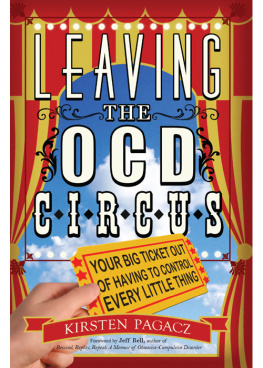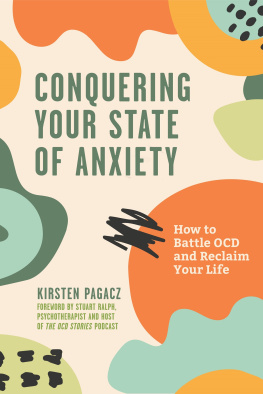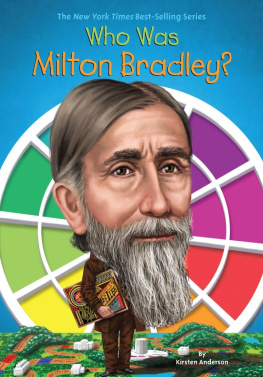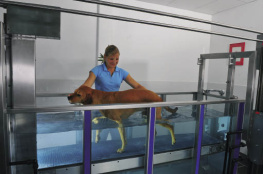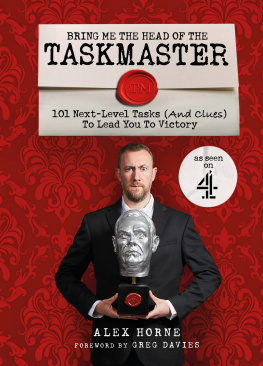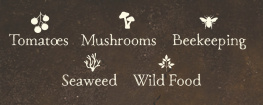PRAISE FOR LEAVING THE OCD CIRCUS
Ms. Pagacz, over a period of years, has poured heart, soul, and sinew, into this book, and the result is remarkable. She describes the torment of OCD from the inside. Fellow sufferers will feel understood; families and friends will gain unique insight into what their loved one is experiencing.
Her compelling narrative abounds with powerful metaphors. Employing a creative scrapbook format, and using photos, Illustrations, and original poems, Ms. Pagacz enhances the text with a power only art can convey.
Beyond the descriptive narrative, however, is a compendium of useful information about the disorder and how to best manage it. Drawing on what worked for her, and based on researching expert advice, chapters contains a summary of useful tips and key points to remember. The result is educational and inspirational.
This memoir of her recovery is a highly valuable, unique gift to the OCD community.
DAN KALB, PHD
Psychologist, OCD specialist

This edition first published in 2016 by Conari Press, an imprint of
Red Wheel/Weiser, LLC
With offices at:
65 Parker Street, Suite 7
Newburyport, MA 01950
www.redwheelweiser.com
Copyright 2016 by Kirsten Pagacz
All rights reserved. No part of this publication may be reproduced or transmitted in any form or by any means, electronic or mechanical, including photocopying, recording, or by any information storage and retrieval system, without permission in writing from Red Wheel/Weiser, LLC. Reviewers may quote brief passages.
ISBN: 978-1-57324-681-1
Library of Congress Cataloging-in-Publication Data
Names: Pagacz, Kirsten, author.
Title: Leaving the OCD circus : your big ticket out of having to control every little thing / Kirsten Pagacz.
Other titles: Leaving the obsessive-compulsive disorder circus
Description: Newburyport, MA : Conari Press, 2016. | Includes bibliographical references.
Identifiers: LCCN 2016017700 | ISBN 9781573246811 (paperback)
Subjects: LCSH: Obsessive-compulsive disorder. | Obsessive-compulsive disorder--Treatment. | BISAC: SELF-HELP / Mood Disorders. |
PSYCHOLOGY /
Psychopathology / Compulsive Behavior.
Classification: LCC RC533 .P25 2016 | DDC 616.85/227--dc23
LC record available at https://lccn.loc.gov/2016017700
Cover art and design by Doug Pagacz
Interior images Kirsten Pagacz unless otherwise noted
Interior by Joseph Allen Black
josephallenblack.com
Typeset in Bell MT
Printed in the United States of America
M&G
10 9 8 7 6 5 4 3 2 1
www.redwheelweiser.com
www.redwheelweiser.com/newsletter
I dedicate this book to individuals who suffer with OCD and their friends and family. I wrote this book for you. Your freedom is important to me.
To my best friend, Doug, and my loving mother, Sandra. We've shared decades together, filled with ups and downs. Thank you for your never-ending supply of love and believing in me when I struggled to believe in myself. You are forever in the biggest part of my heart.
This book is not intended to diagnose, treat, or prevent any illness or act as a substitute for advice from a doctor or psychiatrist. Except for my husband, mother, Dr. Kalb, Pam, Victoria, Oana and my dog Rocket, and cat Angela, all names and identifying details have been changed.
CONTENTS
FOREWORD
When I first met Kirsten Pagacz, we were both attending the International OCD Foundation's annual conference. She had just purchased a copy of my memoir and asked me to sign it. While I can't honestly say I remember our conversation that day, I do know what I wrote just above my signature: All things are possible when we dare to believe.
It dawns on me today, so many years later, that Kirsten's story and the very book you're now holding are powerful proof of that scribbled declaration.
There's a reason obsessive-compulsive disorder (OCD) is known as the Doubting Disease. At its core are intrusive what-if questions that can become so overwhelming sufferers will do almost anythingincluding performing all kinds of nonsensical ritualsin desperate attempts to relieve their anxiety. Consumed by these relentless obsessions and the compulsions they spawn, individuals with OCD find themselves doubting virtually everything, including their own abilities and judgment.
I know this from experience, having nearly lost everything to OCD many years ago, but I also know that recovery is possibleif, and only if, one dares to believe. Belief, after all, is the true antidote to doubt, and those with the courage to cultivate it can, in fact, do anything, including take back their lives from the grips of this debilitating disorder. Kirsten gets this, and by sharing her inspiring story in these pages she offers us not only great hope but also a reminder of the mechanics of believingin ourselves, in others, and in life itself.
It's often said that good writing shows rather than tells, and Kirsten has done a masterful job demonstrating through her stories just what it's like to live with OCD. When she describes the agony she's in while battling an especially horrific obsession and notes that she could no longer tell the difference between an actual situation and a thought, we are right there inside her head; and when she recounts an exposure challenge she undertakes in a grocery store, we can feel the pain and exhaustion she's fighting. Especially for those who have not experienced OCD, this kind of peek behind the curtains is truly invaluable.
As someone who stumbled through the mental health treatment world for far too long before getting into proper therapy, I find myself ever vigilant for well-intentioned but misguided information about OCD and its treatment. I can assure you that there's none of that in this book. From Kirsten's intimate depictions of obsessions and compulsions and their dysfunctional interplay (which she creatively calls OCD math) to her detailed descriptions of exposure and response prevention treatment, the information is spot-on. That Kirsten adds to all this her insightful Key Points to Remember sections is a big bonus for readers looking for practical tools they can apply in following her path to recovery.
While there are many wonderful accounts of what it's like to live with OCD, there is something especially powerful about the message Kirsten aims to leave her readers witha message very near and dear to me. For years I have been writing and speaking about the value of what I call Greater Good motivation. Through my own journey, and those of so many other OCD survivors I've met, I've become convinced that purpose and service are the most powerful motivators available to us when battling fear and doubt. Time and again in these pages, Kirsten makes clear that she too has discovered this, explaining, for example, why she decided to tell her story: Helping OCD sufferers and those loved ones who are trying to understand them was my burning motivation.
When I wrote my inscription for Kirsten all those years ago, I never could have known that I'd be privileged to write those same words again at the beginning of her wonderful book. I think we can now both say with great certainty that truly all things are possible when we dare to believe.
JEFF BELL
Author of Rewind, Replay, Repeat and When in Doubt, Make Belief
INTRODUCTION
When I was nine, I started developing obsessive-compulsive disorder (OCD). And I lived in its grip for over twenty years. People without OCD often ask me what it feels like. Imagine you have to build a house of cards. Your OCD is the blowing fan right next to it. You can't stop yourself from building the house of cards because your brain has a hiccup, and the fan will never shut off. And, oh yeah, there is someone holding a gun to your head demanding that you perform perfectly.

